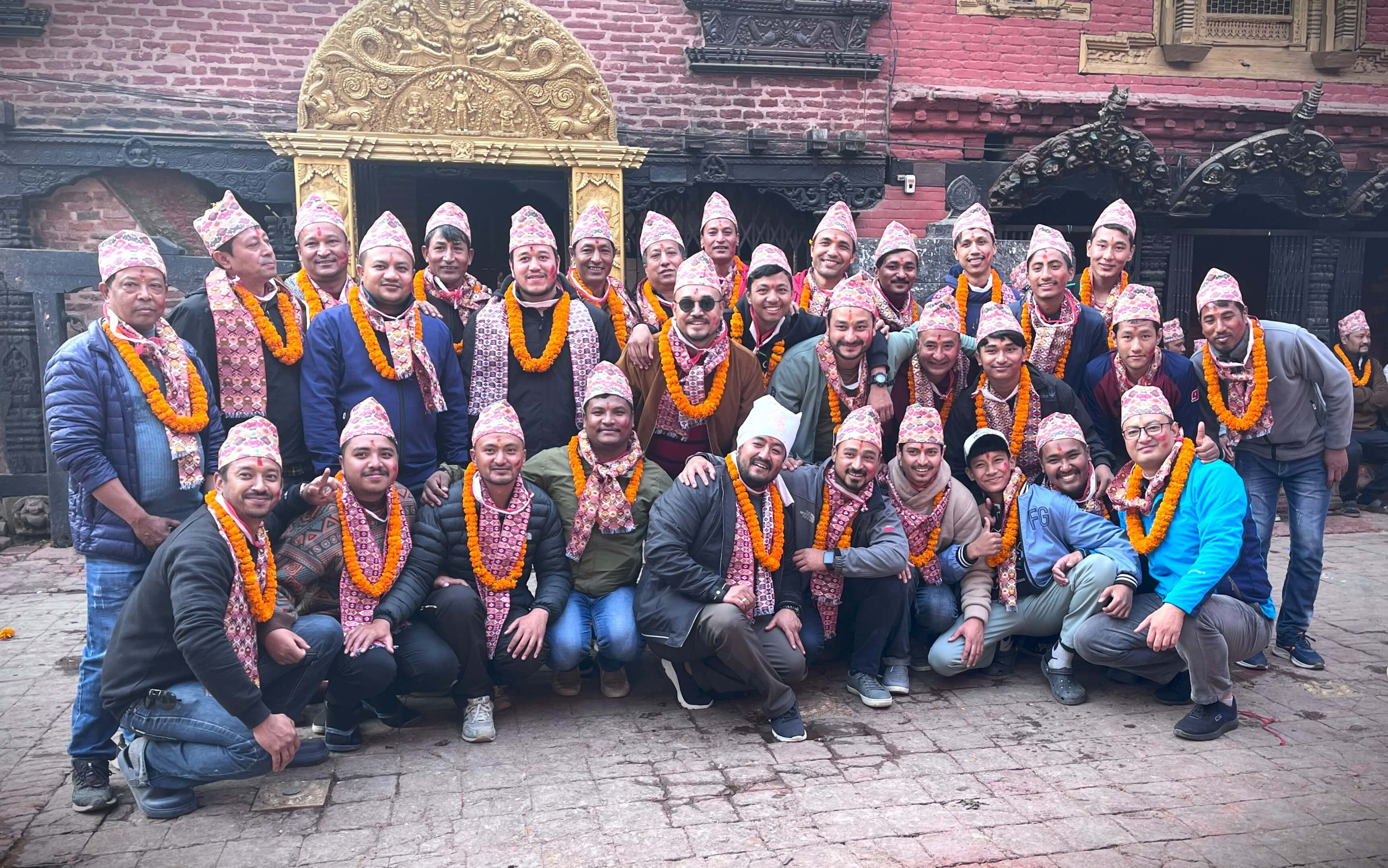In Newari culture, musical communities known as Khalas play a vital role in organizing and performing traditional music for cultural, religious, and social events. A Dafa Khala, in particular, focuses on traditional Newari music tied to these ceremonies, helping to preserve the rich musical heritage and ensure its continuity across generations.
Harisiddhi, an ancient Newari village originally called Jestapur, is steeped in rich religious and cultural traditions, with 90% of its residents belonging to the Maharjan community. Various groups, or Khalas, such as Dafa Khala, Dhime Khala, Dhaa Khala, and others, perform unique roles in the village's social and cultural fabric. Each Khala contributes significantly to maintaining and celebrating Harisiddhi's rich heritage.

The legacy of Ko Khi Dafa Khala has been preserved through the knowledge and dedication of its esteemed Gurus, who have passed down their teachings from generation to generation. Their contributions have played a vital role in conserving the traditional rituals, norms, and values of the Kha:la:. Below is a list of the revered Gurus who have contributed to this rich tradition:
These Gurus have continuously nurtured the traditions and values of Ko Khi Dafa Khala, ensuring that its rich cultural heritage thrives in the present day.
| S No. | Gurus | Family Name (Kunna) | Remarks |
|---|---|---|---|
| 1 | Late Mr. Sankha Narayan Maharjan | Ta-Mi | First Guru |
| 2 | Late Mr. Mojman Maharjan | - | Second Guru |
| 3 | Late Mr. Hera Kumar Maharjan | Bhayo | Third Guru |
| 4 | Late Mr. Hari Maharjan and Late Mr. Ram Maharjan | Enbi and Bhasii | Fourth Gurus |
| 5 | Mr. Dhan Bahadur Maharjan and Late Mr. Narayan Maharjan | Lyabchen and Inbi | Fifth Gurus |
| 6 | Mr. Dhan Bahadur Maharjan | Lyabchen | Current Gurus |
The Ko Khi Dafa Khala, like other Khalas in Harisiddhi, plays an essential role in various cultural and religious events throughout the year. One of the key performances is during Gula Bhajan, which starts from Shrawan Sukhlapakhsya Pratipada and continues until Bhadra Krishna Pakshya Kushi Aushi, lasting for one month and performed in the morning. Following this is the Yola Bhajan, held from Bhadra Krishna Pakhsya Kushi Aushi to Ashwin Sukhlapakhsya Pratipada (Gatastapana). This event is performed at night, where women from each Dafa Khala light “Itta (a traditional wick used in Newari culture for lighting lamps during religious ceremonies and worship in the temples)” between Dyegu Dhyo and Lachi, with the respective Khala following them, playing Dafa Bhajan. This, too, lasts for one month.
During the festive period of Nal Swaniu, which begins from Ashwin Sukhlapakhsya Pratipada (Gatastapana) and continues until Ashwin Sukhlapakhsya Saptami (Fulpati), each Dafa Khala visits the Ward Chairperson’s house and performs Dafa Bhajan at night for seven days. Afterward, Kartik Bhajan starts from Ashwin Sukhlapakhsya Purnima and continues until Kartik Sukhlapakhsya Purnima, performed at night for one month. Finally, Magh Bhajan takes place from Poush Sukhla pakhsya Purmina to Magh Sukhlapakhsya Purnima, during which the bhajan is performed in the morning for another month. In addition to this, it performs at joyous occasions like weddings, Bratabanda, Satya Narayan Puja, and other auspicious ceremonies, offering both entertainment and spiritual hymns.
| S No. | Event Name | Start Date | End Date | Duration | Performance Time |
|---|---|---|---|---|---|
| 1 | Gula Bhajan | Shrawan Sukhlapakhsya Pratipada | Bhadra Krishna Pakshya Kushi Aushi | 1 month | Morning |
| 2 | Yola Bhajan | Bhadra Krishna Pakshya Kushi Aushi | Ashwin Sukhlapakhsya Pratipada (Gatastapana) | 1 month | Night |
| 3 | Nal Swaniu | Ashwin Sukhlapakhsya Pratipada (Gatastapana) | Ashwin Sukhlapakhsya Saptami (Fulpati) | 7 days | Night |
| 4 | Kartik Bhajan | Ashwin Sukhlapakhsya Purnima | Kartik Sukhlapakhsya Purnima | 1 month | Night |
| 5 | Magh Bhajan | Poush Sukhla pakhsya Purnima | Magh Sukhla pakhsya Purnima | 1 month | Morning |
| S No. | Event Name | Date | Performance Time |
|---|---|---|---|
| Details | |||
| 1 | Lakhe Naach | Shrawan Shukala Pakhsya Chaturthi | Evening |
|
|||
| 2 | Gai Jatra | Bhadra Krishna Pakhsya Pratipada | Day |
|
|||
| 3 | Jyo Dhalbuyau | Bhadra Krishna Pakhsya Ditiya | Afternoon |
|
|||
| 4 | Krishna Janamastami | Bhadra Krishna Pakhsya Astami | Midnight |
|
|||
| 5 | Buwa ko Mukh Herne | Bhadra Krishna Pakhsya Aunshi | Day and Night |
|
|||
| 6 | Indra Jatra | Bhadra Shukla Pakhsya Purnima | Midnight |
|
|||
| 7 | Gathasthapana | Asoj Sukhla Pakhsya Pratipada | Day |
|
|||
| 8 | Fulpati | Asoj Sukhla Pakhsya Saptami | Afternoon |
|
|||
| 9 | Dashain Nawami | Asoj Sukhla Pakhsya Nawami | Afternoon |
|
|||